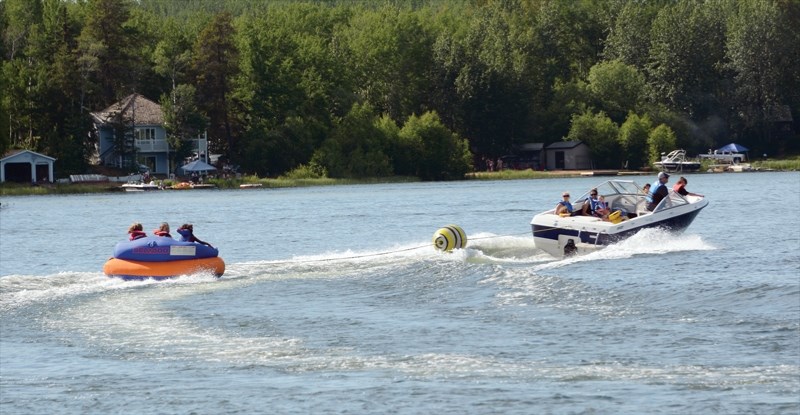Residents and property owners in the Long Island Lake area packed Westlock County council chambers in hopes of seeing the municipality finally undertake an environmental impact study on the lake.
A group of around 30 attended council’s Tuesday, Jan. 12 meeting and were critical of council’s desire to further develop around the lake. They called for a moratorium on development until the county commissions an environmental impact study.
Reeve Bud Massey assured residents they’re looking into conducting a study, although there is no timeframe in place.
“We’re still looking. We’ve had ongoing conversation with Larkspur,” Massey later said.
“It’s an expensive undertaking. We’ve heard figures from $250,000 to $300,000 — that’s a significant amount of money.
“Is there some advantage to doing it? Yes. Are we doing some research to see if we can get provincial government funding? Yes, we are. It’s a very serious issue and we have taken a good serious look at it.”
Massey has repeatedly stated that the county is looking to add stalls at the Long Island Lake Campground and is awaiting grant funding to improve amenities.
“We also have to be aware of the desires and needs of the people who use the municipal beach,” the reeve said.
“We understand and want to maintain the quality of the lake, but we also have to make sure that all people in our county get to use that wonderful recreation facility.”
Water quality was at the forefront of discussion amongst residents who fear invasive species and bacteria such as blue-green algae will ruin the lake.
Larkspur resident and biologist David McGraw, who attended council for a different issue, said residents have a right to be concerned.
“I am a biologist and I work for environmental consulting companies and the people at Larkspur that live on the lake — I don’t live on the lake, I live just south — have real concern and it’s valid,” McGraw said.
Cottager Ehreth Horinek told council about a water quality study he did about 15 years ago and called on council to continue it.
“What we did was we jumped in our boat, took a bunch of testing equipment … took all theses vials all over the lake at different depths to see if there was any phosphorous in the lake, which promotes blue-green algae,” Horinek explained.
“The study came back and there was some impact, but the lake was still pretty healthy.
“I think council should do testing themselves. You guys are making the money from the cabins, spend some back and put it in the lake so you know what’s going on.”
Larkspur’s Ken Schauenberg warned that increased activity would decrease water quality and could spread invasive species.
“I’m a full-time resident of the lake and my greatest concern is the lake water quality. As you know there are so few clean lakes in Alberta and I strive daily to promote an attitude to preserve that lake,” Schauenberg said.
“My concern is that more human activity on the lake will gradually, if not very quickly, lose that water quality.
“That may even be a bigger problem is the fact that we will have to deal with zebra mussels … they have a nasty habit of being prolific multipliers and plug off water intake and even boat motor intakes. They are being detected in southern Alberta already.”
Schauenberg cited Lake Winnipeg and several Saskatchewan lakes that have been overtaken by aggressive and invasive species. Many also cited concerns that Long Island Lake could be the next to fall victim to blue-green algae, which has overtaken nearby Pigeon Lake and Thunder Lake.
Massey’s comments have area residents concerned about the addition of more stalls and say the lake is busy enough.
“Me and my husband’s concern has lots to do with the amount of boats that are currently on the lake and if you open up more campsites it seems logical there would be more boats,” said resident Norine Schuster.
“At different times on the weekends, usually long weekends, if you go for a cruise you take your life in your hands. I counted 29 boats on the north end of the lake and that’s not including Sea-Doos.”
Other property owners also complained they can’t enjoy the lake with day users’ boats crowding the lake, especially on weekends.
“The lake isn’t what it was when I was growing up. It was easy to get out there and go at all times,” said Colin Lawrence.
“Nowadays, you’ve got to get up at 7 a.m. and you ski until 11 a.m. and then you park your boat because you’re not going on the lake after that.”
Lawrence, along with many other residents, agreed the lake is a public asset, but said overcrowding is a real concern.
“It is for everyone’s recreation, but I guess as an analogy goes it’s kind of like inflatable bouncy houses,” he said.
“Every kid wants to go in there right now, if we let every kid in there either two things happen: either it breaks, or somebody gets hurt.
“That’s what’s going to happen at this lake if you just keep pushing it.”
Others called for the municipality to up the $5 daily fee to use the lake and cap the number of boats.
Massey, however, assured residents that no new development would commence until an environmental impact study was undertaken.
“A lot of people have expressed a desire to use the lake and haven’t had the opportunity … demand far outstrips availability,” Massey said.
“It’s something that had to be looked into and what the result will be, will be determined after a gathering of much information.”



